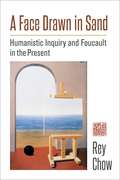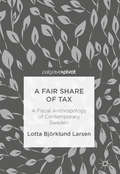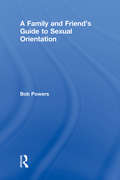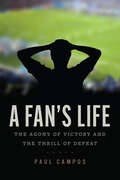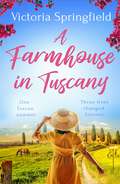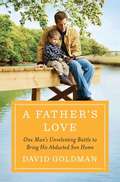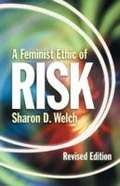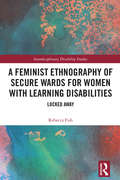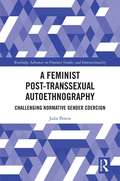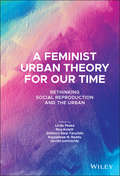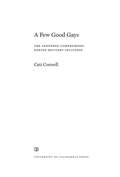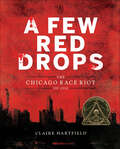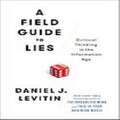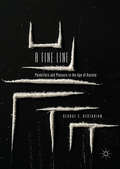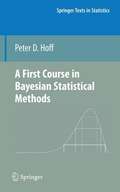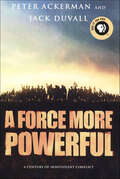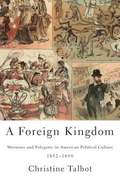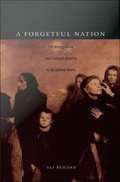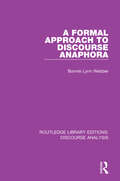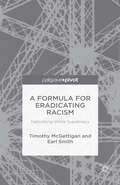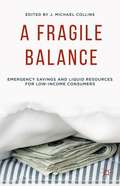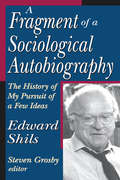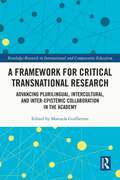- Table View
- List View
A Face Drawn in Sand: Humanistic Inquiry and Foucault in the Present
by Rey ChowLeadership, innovation, diversity, inclusiveness, sharing, accountability—such is the resounding administrative refrain we keep hearing in the contemporary Western university. What kinds of benefits does this refrain generate? For whom? What discursive incitements undergird such benefits? Although there are innumerable discussions of Michel Foucault in the English-speaking academy, seldom is his work used systematically to unravel the dead ends and potentialities of humanistic inquiry as embedded in these simple but dynamic questions.Rey Chow takes up this challenge by articulating the plight of the humanities in the age of global finance and neoliberal mores through a resharpened focus on Foucault’s concept “outside.” This general discussion is followed by a series of micro-arguments about several loosely linked topics: the biopolitics of literary study, visibilities and invisibilities, race and racism, sound/voice/listening, and confession and self-entrepreneurship. Against what she polemicizes as the moralistic-entrepreneurial norming of knowledge production, Chow foregrounds a nonutilitarian approach, stressing anew the intellectual and pedagogical objectives fundamental to humanistic inquiry: How to process, analyze, and evaluate different types of texts across languages and disciplines; how to form and sustain viable arguments; how to rethink familiar problems through less known as well as very well-known sources, figures, and methods. Above all, she asks in an abidingly humanistic spirit, how not to know all the answers before the questions have been posed.
A Fair Share of Tax: A Fiscal Anthropology of Contemporary Sweden
by Lotta Björklund LarsenThis book is open access under a CC BY 4.0 license.This book takes a taxpayer's perspective on the relations taxation creates between people and their state. Björklund Larsen proposes that in order to understand tax compliance and cheating, we have to look beyond law, psychological experiments and surveys to also include tax collectors and taxpayers' practices. The text explores the view of taxes seen as citizen’s explicit economic relation to the state and implicit economic relation to all other compatriots. Björklund Larsen directs our gaze onto the concept of reciprocity, which is often proposed as an explanation in tax compliance research, and explores its diverse meanings and implications ethnographically. The empirical cases are based on ethnography from two opposing tax practices in Sweden. Firstly, from a study of analysts, auditors, legal experts and managers at the Swedish Tax Agency and how they, quite successfully, strive for legitimacy in their tax collecting activities. Secondly, from fieldwork among a group of middle-aged Swedes and how they justify their purchasing work off the books – essentially tax-cheating practices. Sweden is a modern welfare society with citizens holding rational and secular values, yet trusting their government and fellow citizens. Sweden also has a high tax burden that is collected by one of its most revered governmental agencies – the Swedish Tax Agency - making it an interesting case studying tax compliance.
A Family and Friend's Guide to Sexual Orientation: Bridging the Divide Between Gay and Straight
by Bob Powers Alan EllisA Family and Friend's Guide to Sexual Orientation helps individuals and families to bridge the divide between gay and straight, to heal wounds that often accompany individuals and families' negative feelings about lesbians, gay men, bisexuals, and transgendered persons. Consisting of thirty stories by individuals who have come to accept and embrace their own sexuality, twelve of the stories are by heterosexuals who, in addition to talking about their own sexuality, speak of the homosexuality of a loved one. The book also includes five personal stories from two families.
A Fan's Life: The Agony of Victory and the Thrill of Defeat
by Paul CamposA lifelong sports fanatic plumbs the depths of the fan mindset, tracking the mania from the gridiron to the national political stage and beyond. The Pass. The Curse. The Double Doink. A sports fan’s life is not just defined by intense moments on a field, it’s scarred by them. For a real fan, winning isn’t everything—losing is. The true fans, it’s said, are those who have suffered the most, enduring lives defined by irrational obsession, fervid hopes, and equally gut-wrenching misery. And as Paul Campos shows, those deep feelings are windows not just onto an individual fan’s psychology but onto some of our shared concepts of community, identity, and belonging—not all of which are admirable. In A Fan’s Life, he seeks not to exalt a particular team but to explore fandom’s thorniest depths, excavating the deeper meanings of the fan’s inherently unhappy life. A Fan’s Life dives deep into the experience of being an ardent fan in a world defined more and more by the rhetoric of “winners” and “losers.” In a series of tightly argued chapters that suture together memoir and social critique, Campos chronicles his lifelong passion for University of Michigan football while meditating on fandom in the wake of the unprecedented year of 2020—when, for a time, a global pandemic took away professional and collegiate sports entirely. Fandom isn’t just leisure, he shows; it’s part of who we are, and part of even our politics, which in the age of Donald Trump have become increasingly tribal and bloody. Campos points toward where we might be heading, as our various partisan affiliations—fandoms with a grimly national significance—become all the more intense and bitterly self-defining. As he shows, we’re all fans of something, and making sense of fandom itself might offer a way to wrap our heads around our increasingly divided reality, on and off the field.
A Fan's Life: The Agony of Victory and the Thrill of Defeat
by Paul CamposA lifelong sports fanatic plumbs the depths of the fan mindset, tracking the mania from the gridiron to the national political stage and beyond. The Pass. The Curse. The Double Doink. A sports fan’s life is not just defined by intense moments on a field, it’s scarred by them. For a real fan, winning isn’t everything—losing is. The true fans, it’s said, are those who have suffered the most, enduring lives defined by irrational obsession, fervid hopes, and equally gut-wrenching misery. And as Paul Campos shows, those deep feelings are windows not just onto an individual fan’s psychology but onto some of our shared concepts of community, identity, and belonging—not all of which are admirable. In A Fan’s Life, he seeks not to exalt a particular team but to explore fandom’s thorniest depths, excavating the deeper meanings of the fan’s inherently unhappy life. A Fan’s Life dives deep into the experience of being an ardent fan in a world defined more and more by the rhetoric of “winners” and “losers.” In a series of tightly argued chapters that suture together memoir and social critique, Campos chronicles his lifelong passion for University of Michigan football while meditating on fandom in the wake of the unprecedented year of 2020—when, for a time, a global pandemic took away professional and collegiate sports entirely. Fandom isn’t just leisure, he shows; it’s part of who we are, and part of even our politics, which in the age of Donald Trump have become increasingly tribal and bloody. Campos points toward where we might be heading, as our various partisan affiliations—fandoms with a grimly national significance—become all the more intense and bitterly self-defining. As he shows, we’re all fans of something, and making sense of fandom itself might offer a way to wrap our heads around our increasingly divided reality, on and off the field.
A Farmhouse in Tuscany
by Victoria Springfield'A horseride through Tuscany, charming characters, a rustic farmhouse and love in the air' FIVE STARSWith the backdrop of the Tuscan countryside the characters come alive with a lively and well crafted plot' FIVE STARS'A lovely story about the intertwined lives of family and friends' FIVE STARSUnder the Tuscan sun, the lives of three women are about to change forever... Donna has been running the Bella Vista riding centre from her rambling farmhouse in Tuscany, taking in guests who enjoy the rolling Tuscan hills, home-grown vegetables and delicious pasta. It's been a decade since her husband Giovanni walked out, convinced she was having an affair. When the truth finally comes to light, can everything return to the way it was ten years ago? Or is it too late to start over?When self-confessed workaholic Harriet takes an impromptu holiday to Tuscany, she quickly discovers that the relaxing yoga holiday she had been anticipating will be anything but. She's shocked when she's asked to swap her yoga mat and leggings for riding jodhpurs and a helmet! But the longer she stays at serene Bella Vista, the more she begins to rethink the way she's been living for so long...Shy artist Jess has had a crush on Donna's son Marco from the first moment she saw him. This is her second visit to Bella Vista, and she's secretly hoping to pick up where they left off last summer with an almost-kiss. But is Marco still interested or will this be a summer of sadness? Perfect for fans of Nicky Pellegrino and Angela Petch, let Victoria Springfield whisk you away to to the sun-soaked hills of Tuscany.***Readers are loving A Farmhouse in Tuscany!'A lovely holiday read. Can't wait for the next book!' FIVE STARS'If you want to feel like you are in Tuscany then pick up this book' FIVE STARS'Funny and touching - a definite must read' FIVE STARS'A Farmhouse in Tuscany does not disappoint!' FIVE STARS'The author keeps us guessing right up until the end of this beautiful book' FIVE STARS
A Farmhouse in Tuscany
by Victoria Springfield'A horseride through Tuscany, charming characters, a rustic farmhouse and love in the air' FIVE STARSWith the backdrop of the Tuscan countryside the characters come alive with a lively and well crafted plot' FIVE STARS'A lovely story about the intertwined lives of family and friends' FIVE STARSUnder the Tuscan sun, the lives of three women are about to change forever... Donna has been running the Bella Vista riding centre from her rambling farmhouse in Tuscany, taking in guests who enjoy the rolling Tuscan hills, home-grown vegetables and delicious pasta. It's been a decade since her husband Giovanni walked out, convinced she was having an affair. When the truth finally comes to light, can everything return to the way it was ten years ago? Or is it too late to start over?When self-confessed workaholic Harriet takes an impromptu holiday to Tuscany, she quickly discovers that the relaxing yoga holiday she had been anticipating will be anything but. She's shocked when she's asked to swap her yoga mat and leggings for riding jodhpurs and a helmet! But the longer she stays at serene Bella Vista, the more she begins to rethink the way she's been living for so long...Shy artist Jess has had a crush on Donna's son Marco from the first moment she saw him. This is her second visit to Bella Vista, and she's secretly hoping to pick up where they left off last summer with an almost-kiss. But is Marco still interested or will this be a summer of sadness? Perfect for fans of Nicky Pellegrino and Angela Petch, let Victoria Springfield whisk you away to to the sun-soaked hills of Tuscany.***Readers are loving A Farmhouse in Tuscany!'A lovely holiday read. Can't wait for the next book!' FIVE STARS'If you want to feel like you are in Tuscany then pick up this book' FIVE STARS'Funny and touching - a definite must read' FIVE STARS'A Farmhouse in Tuscany does not disappoint!' FIVE STARS'The author keeps us guessing right up until the end of this beautiful book' FIVE STARS
A Father's Love: One Man's Unrelenting Battle to Bring His Abducted Son Home
by David GoldmanIn June, 2004, Goldman's estranged wife took their four-year-old son Sean to her native Brazil for what she said would be a two-week vacation. Once there she informed Goldman that she was staying in Brazil, setting off an international, headline-making custody battle that waged for five years.
A Feminist Ethic of Risk
by Sharon WelchA Feminist Ethic of Risk proposes a new model for ethics and new life orientation for social justice. It directly addresses American and European "middle-class despair" over issues and challenges seemingly too large to tackle, such as environmental destruction or racism. Her ethic uproots classical assumptions and opens up the possibility of a strong religious vision or "theology of resistance and hope." This new edition includes a new chapter that situates the feminist ethic of risk in relation to other styles and options in religious ethics today.
A Feminist Ethnography of Secure Wards for Women with Learning Disabilities: Locked Away (Interdisciplinary Disability Studies)
by Rebecca FishWhat is life like for women with learning disabilities detained in a secure unit? This book presents a unique ethnographic study conducted in a contemporary institution in England. Rebecca Fish takes an interdisciplinary approach, drawing on both the social model of disability and intersectional feminist methodology, to explore the reasons why the women were placed in the unit, as well their experiences of day-to-day life as played out through relationships with staff and other residents. She raises important questions about the purpose of such units and the services they offer. Through making the women’s voices heard, this book presents their experiences and unique perspectives on topics such as seclusion, restraint, and resistance. Exploring how the ever present power disparity works to regulate women’s behaviour, the book shows how institutional responses replicate women’s bad experiences from the past, and how women’s responses are seen as pathological. It demonstrates that women are not passive recipients of care, but shape their own identity and futures, sometimes by resisting the norms expected of them (within allowed limits) and sometimes by transgressing the rules. These insights thus challenge traditional institutional accounts of gender, learning disability and deviance and highlight areas for reform in policy, practice, methodology, and social theory. This ground-breaking book will be of interest to scholars, students, policymakers and advocates working in the fields of learning disability and disability studies more widely, gender studies and sociology.
A Feminist Post-transsexual Autoethnography: Challenging Normative Gender Coercion (Routledge Advances in Feminist Studies and Intersectionality)
by Julie Elizabeth PetersGender as a social class along with its concomitant heteronormative gender coercion seem to be intransigent across time and cultures. But across these cultures we also see a degree of nonconforming behaviour which very often carries significant multi-dimensions of stigma and risk; because the exception proves the rule, an understanding of gender nonconformity sheds light on the normative operation of gender in society. A Feminist Post-transsexual Autoethnography attempts to demythologise trans and gender diversity by conducting an in-depth critical analysis of the life choices of the autoethnographic subject (the author), who was so uncomfortable with their culturally allocated masculinity that they chose to live an apparently normal female life. The research is post-transsexual in that the subject forgoes passing in their affirmed gender to ensure the integrity of the data. A Feminist Post-transsexual Autoethnography may primarily appeal to students and researchers interested in the Sociology of Gender and Sociology of Trans and Gender Diversity, as well as the broader areas of embodiment and power differentials based on gender, class, nationality, location, temporality, sexuality and gender (non)conformity. This insightful volume may also be of interest to those within the fields Health Promotion and Education, Human Rights, Social Justice and Equity or the Social and Cultural Anthropology of Gender.
A Feminist Urban Theory for Our Time: Rethinking Social Reproduction and the Urban (Antipode Book Series)
by Linda Peake Elsa Koleth Gökbörü Sarp Tanyildiz Rajyashree N. Reddy Darren Patrick DpWhat does a feminist urban theory look like for the twenty first century? This book puts knowledges of feminist urban scholars, feminist scholars of social reproduction, and other urban theorists into conversation to propose an approach to the urban that recognises social reproduction both as foundational to urban transformations and as a methodological entry-point for urban studies. Offers an approach feminist urban theory that remains intentionally cautious of universal uses of social reproduction theory, instead focusing analytical attention on historical contingency and social difference Eleven chapters that collectively address distinct elements of the contemporary crisis in social reproduction and the urban through the lenses of infrastructure and subjectivity formation as well as through feminist efforts to decolonize urban knowledge production Deepens understandings of how people shape and reshape the spatial forms of their everyday lives, furthering understandings of the 'infinite variety' of the urban Essential reading for academics, researchers and scholars within urban studies, human geography, gender and sexuality studies, and sociology
A Few Good Gays: The Gendered Compromises behind Military Inclusion
by Cati ConnellThe US military has done an about-face on gender and sexuality policy over the last decade, ending Don’t Ask, Don’t Tell, restrictions on women in combat, and transgender exclusion. Contrary to expectations, servicemembers have largely welcomed cisgender LGB individuals—yet they continue to vociferously resist trans inclusion and the presence of women on the front lines. In the minds of many, the embodied "deficiencies" of cisgender women and trans people of all genders puts others—and indeed, the nation—at risk. In this book, Cati Connell identifies the homonormative bargain that underwrites these uneven patterns of reception—a bargain that comes with significant concessions, upholding and even exacerbating race, class, and gender inequality in the pursuit of sexual equality. In this handshake deal, even the widespread support for open LGB service is highly conditional, revocable upon violation of the bargain. Despite the promise of inclusivity, in practice, the military has made room only for a "few good gays," to the exclusion of all others. But should equal access be the goal? How did we get from there to here? And where do we go next? In analyzing inclusion as a social movement aspiration, Connell shows that its steep price is exacted through the continued abjection of queered Others, both at home and abroad.
A Few Red Drops: The Chicago Race Riot of 1919
by Claire HartfieldThis mesmerizing narrative nonfiction draws on contemporary accounts as it traces the roots of an explosion that had been building for decades in race relations, politics, business, and clashes of culture.Coretta Scott King Award winner * Carter G. Woodson Book Award from the National Council for the Social StudiesOn a hot day in July 1919, five black youths went swimming in Lake Michigan, unintentionally floating close to the "white" beach. An angry white man began throwing stones at the boys, striking and killing one.Racial conflict on the beach erupted into days of urban violence that shook the city of Chicago to its foundations. A Few Red Drops is "readable, compelling history," The Horn Book wrote, adding that the book uses "meticulously chosen archival photos, documents, newspaper clippings, and quotes from multiple primary sources."Includes archival photos and prints, source notes, bibliography, and an index.
A Field Guide to Lies: Critical Thinking in the Information Age
by Daniel J. LevitinFrom The New York Times bestselling author of THE ORGANIZED MIND and THIS IS YOUR BRAIN ON MUSIC, a primer to the critical thinking that is more necessary now than ever. We are bombarded with more information each day than our brains can process--especially in election season. It's raining bad data, half-truths, and even outright lies. New York Times bestselling author Daniel J. Levitin shows how to recognize misleading announcements, statistics, graphs, and written reports revealing the ways lying weasels can use them. It's becoming harder to separate the wheat from the digital chaff. How do we distinguish misinformation, pseudo-facts, distortions, and outright lies from reliable information? Levitin groups his field guide into two categories--statistical infomation and faulty arguments--ultimately showing how science is the bedrock of critical thinking. Infoliteracy means understanding that there are hierarchies of source quality and bias that variously distort our information feeds via every media channel, including social media. We may expect newspapers, bloggers, the government, and Wikipedia to be factually and logically correct, but they so often aren't. We need to think critically about the words and numbers we encounter if we want to be successful at work, at play, and in making the most of our lives. This means checking the plausibility and reasoning--not passively accepting information, repeating it, and making decisions based on it. Readers learn to avoid the extremes of passive gullibility and cynical rejection. Levitin's charming, entertaining, accessible guide can help anyone wake up to a whole lot of things that aren't so. And catch some lying weasels in their tracks!
A Fine Line: Painkillers And Pleasure In The Age Of Anxiety
by George C. DertadianAre painkillers mundane medications safe for use to ease human suffering? Or are they drugs of abuse that cause addiction and death? Do they ameliorate pain, or do they cause it? This book explores growing interest among medical practitioners media outlets about the ‘misuse’ or ‘abuse’ of pharmaceutical pain medications. It contextualizes these emerging discourses of pharmaceutical ‘abuse’ within the social and political histories from which they have emerged by exploring the role of pleasure and pain in shaping individualized modes of medication consumption in a neoliberal age of anxiety.The book is divided into two parts: the first addresses the discursive construction of painkiller (ab)use as articulated in research and policy accounts; the second part provides an empirical investigation that draws on the lived experience of those who engage in non-medical consumption. This book argues that, contrary to the stereotype of the ‘seductive’ drug that coaxes its user into a life of dysfunction, there appears to be an intimate relationship between the motivations of pleasure seeking, health practice and productive citizenship among people who use painkillers for non-medical reasons.
A First Course in Bayesian Statistical Methods (Springer Texts in Statistics)
by Peter Hoff<p>1. A self-contained introduction to probability, exchangeability and Bayes’ rule provides a theoretical understanding of the applied material. <p>2. Numerous examples with R-code that can be run "as-is" allow the reader to perform the data analyses themselves. <p>3. The development of Monte Carlo and Markov chain Monte Carlo methods in the context of data analysis examples provides motivation for these computational methods.</p>
A Force More Powerful: A Century of Nonviolent Conflict
by Peter Ackerman Jack DuVallThis nationally-acclaimed book shows how popular movements used nonviolent action to overthrow dictators, obstruct military invaders and secure human rights in country after country, over the past century. Peter Ackerman and Jack DuVall depict how nonviolent sanctions--such as protests, strikes and boycotts--separate brutal regimes from their means of control. They tell inside stories--how Danes outmaneuvered the Nazis, Solidarity defeated Polish communism, and mass action removed a Chilean dictator--and also how nonviolent power is changing the world today, from Burma to Serbia.
A Foreign Kingdom: Mormons and Polygamy in American Political Culture, 1852-1890
by Christine TalbotThe years from 1852 to 1890 marked a controversial period in Mormonism, when the church's official embrace of polygamy put it at odds with wider American culture. In this study, Christine Talbot explores the controversial era, discussing how plural marriage generated decades of cultural and political conflict over competing definitions of legitimate marriage, family structure, and American identity. In particular, Talbot examines "the Mormon question" with attention to how it constructed ideas about American citizenship around the presumed separation of the public and private spheres. Contrary to the prevailing notion of man as political actor, woman as domestic keeper, and religious conscience as entirely private, Mormons enfranchised women and framed religious practice as a political act. The way Mormonism undermined the public/private divide led white, middle-class Americans to respond by attacking not just Mormon sexual and marital norms but also Mormons' very fitness as American citizens. Poised at the intersection of the history of the American West, Mormonism, and nineteenth-century culture and politics, this carefully researched exploration considers the ways in which Mormons and anti-Mormons both questioned and constructed ideas of the national body politic, citizenship, gender, the family, and American culture at large.
A Forgetful Nation: On Immigration and Cultural Identity in the United States
by Ali BehdadIn A Forgetful Nation, the renowned postcolonialism scholar Ali Behdad turns his attention to the United States. Offering a timely critique of immigration and nationalism, Behdad takes on an idea central to American national mythology: that the United States is "a nation of immigrants," welcoming and generous to foreigners. He argues that Americans' treatment of immigrants and foreigners has long fluctuated between hospitality and hostility, and that this deep-seated ambivalence is fundamental to the construction of national identity. Building on the insights of Freud, Nietzsche, Foucault, and Derrida, he develops a theory of the historical amnesia that enables the United States to disavow a past and present built on the exclusion of others. Behdad shows how political, cultural, and legal texts have articulated American anxiety about immigration from the Federalist period to the present day. He reads texts both well-known--J. Hector St. John de Crvecoeur's Letters from an American Farmer, Alexis de Tocqueville's Democracy in America, and Walt Whitman's Leaves of Grass--and lesser-known--such as the writings of nineteenth-century nativists and of public health officials at Ellis Island. In the process, he highlights what is obscured by narratives and texts celebrating the United States as an open-armed haven for everyone: the country's violent beginnings, including its conquest of Native Americans, brutal exploitation of enslaved Africans, and colonialist annexation of French and Mexican territories; a recurring and fierce strand of nativism; the need for a docile labor force; and the harsh discipline meted out to immigrant "aliens" today, particularly along the Mexican border.
A Formal Approach to Discourse Anaphora (RLE: Discourse Analysis)
by Bonnie Lynn WebberFirst published in 1979, this book starts from the perspective that dealing with anaphoric language can be decomposed into two complementary tasks: 1. identifying what a text potentially makes available for anaphoric reference and 2. constraining the candidate set of a given anaphoric expression down to one possible choice. The author argues there is an intimate connection between formal sentential analysis and the synthesis of an appropriate conceptual model of the discourse. Some of the issues with the creation of this conceptual model are discussed in the second chapter, which follows a background to the thesis that catalogues the types of anaphoric expression available in English and lists the types of things that can be referred to anaphorically. The third and fourth chapters examine two types of anaphoric expression that do not refer to non-linguistic entities. The final chapter details three areas into which this research could potentially be extended. This book will be of interest to students of linguistics.
A Formula for Eradicating Racism: Debunking White Supremacy
by Earl Smith Timothy McGettiganIn this book, Tim McGettigan and Earl Smith make the unprecedented argument that racism is a remediable form of suggestion-induced sadism. The authors explain in plain terms how societies like the USA construct racism, and put forward a practical plan to eradicate racism in the USA and all over the world.
A Fragile Balance
by J. Michael CollinsA Fragile Balance examines strategies to promote emergency savings, especially among underserved households. Each chapter is by an expert contributor and proposes an innovative financial product or service designed to bolster emergency savings among low-asset families. This collection also offers readers insights into the role of emergency savings and mechanisms to facilitate savings behaviors, and raises critical questions of the scale, institutional capacity, sustainability, accessibility, and effectiveness of existing programs.
A Fragment of a Sociological Autobiography: The History of My Pursuit of a Few Ideas
by Edward ShilsEdward Shils was one of the giants of sociological theory in the period after World War II. In this autobiography, written three years before his death in 1995, Shils reflects on the remarkable range of his life's work and activities, including founding and editing the journal "Minerva", being a central figure in the Congress of Cultural Freedom, serving as a founding member of the editorial board of "The Bulletin of Atomic Scientists", and being a member of the International Council on the Future of the University. Shils recognizes that a unity of concern runs through his many theoretical writings and activities. Early in his life, the concern was expressed as understanding the character of consensus. During the last fifteen years of his life, he refined his understanding of consensus through investigation of the nature of "collective self-consciousness." That concern was the structure and character of the moral order of a society, and, in particular, liberal, democratic society. Accompanying the autobiography are two unpublished essays, "Society, Collective Self-Consciousness and Collective Self-Consciousnesses" and "Collective Self-Consciousness and Rational Choice," two areas of intellectual concern discussed in the autobiography. The book contains fascinating discussion of many of the people Shils knew throughout his illustrious career: Robert Park, Louis Wirth, Talcott Parsons, Karl Mannheim, Michael Polanyi, Audrey Richards, Karl Popper, Robert Merton, and many others. They represent Shils' final formulations on the character of society and its moral order. As such, it is a most important contribution both to the history of the social sciences in the twentieth century and to sociological theory.
A Framework for Critical Transnational Research: Advancing Plurilingual, Intercultural, and Inter-epistemic Collaboration in the Academy (Routledge Research in International and Comparative Education)
by Manuela GuilhermeBy foregrounding successful transnational research projects conducted across Latin America and Europe, this edited collection contests epistemological hegemony and heterogeneity in the academy and highlights feasible models for research cooperation across diverse languages, cultures, and epistemologies. Chapters focus on the practical and theoretical tenets of responsible intra-national research and propose the "Glocacademia" framework as a means of enhancing critical reflection on issues that can inhibit plurilingual, intercultural, and inter-epistemic research. The text offers key recommendations to support institutions and researchers to develop intercultural awareness, multi-level citizenship, and a readiness to embrace diverse knowledge ecologies. The book builds on existing discussions on multiculturalism, interculturality, and transculturality to offer high academic value to the discussion of higher education and research. Offering important contributions to the study of global academic research, this volume will be of interest to scholars and researchers with an interest in international and comparative education, as well as multicultural studies in education research.
